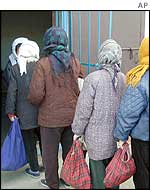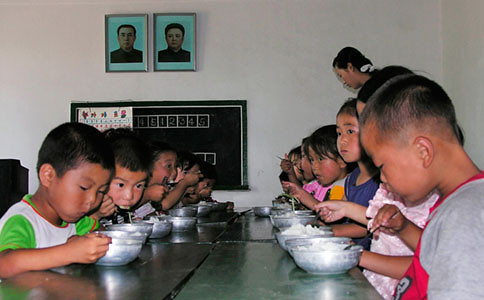NK Moves to Control Grain Sales
 Either you believed North Korea’s markets and food price hikes represented reform, or you believed they represented the state’s attempt to stay ahead of the disintegration of its own failing system. To the extent there was reform, the L.A. Times reports that the experiment appears to be over:
Either you believed North Korea’s markets and food price hikes represented reform, or you believed they represented the state’s attempt to stay ahead of the disintegration of its own failing system. To the extent there was reform, the L.A. Times reports that the experiment appears to be over:
SEOUL — Rolling back some of its economic reforms, North Korea is banning the sale of rice and other grains at private markets and strengthening its old communist-style public distribution system under which all citizens are supposed to get rations, aid groups and North Korea experts say.
The changes were supposed to be implemented Oct. 10, a holiday in North Korea marking the 60th anniversary of the ruling Workers’ Party. But reports from the World Food Program office in Pyongyang, the capital, indicate that merchants have been told already that they can no longer sell grain.
The United Nations agency said in a statement on its website that “as of Oct. 1, reports are that cereal sales in the markets will cease and public distribution centers will take over countrywide distribution.”
North Korea experts say the moves do not necessarily indicate an abrupt U-turn in the impoverished country’s economic policies, so much as concern that change was taking place too quickly.
“I think it is a transitional necessity. You can’t move too fast into free-market economics without softening the blow for people who have grown up in a planned economy,” Richard Ragan, who heads the World Food Program office in Pyongyang, said in a recent telephone interview. “This is not that different from what you saw happening in China in the 1990s.”
Lee Young Hwa, a Japan-based human rights worker who has close contacts with traders at the Chinese-North Korean border, believes the new restrictions on markets are designed to boost the power of the Workers’ Party and curb the role of the military in the economy.
“The military people control the food sold at the market. Nobody else has the trucks or the access to gasoline to move food around the country. The leadership fears that their economic reforms aren’t working because everything is controlled by the military, and they want to take back control,” Lee said.
For years, there have been accusations that the military was pilfering humanitarian shipments of rice and other aid, keeping the best for its own and selling the rest at markets. Secretly taped video footage obtained last year by human rights workers shows apparently unopened sacks of rice given by the U.S. and other donors being sold illegally at a market in the northern city of Chongjin.
The story then discusses how few ordinary North Koreans can afford market prices. A free market in food, for all of the initial hardship it could cause, would be a more efficient way to feed the people if there were also free markets in wages and other goods and services. But in North Korea, jobs and business licenses are plum privileges, meaning that citizens in the lower songbun (political classes) have no way to earn food for their families. Nationalizing the food supply would be the next best alternative to free markets, but for the fact that we know the food won’t be distributed fairly.
On another note, it’s time we conservative bloggers accepted the fact that our swarm against the L.A. Times’s Barbara Demick was unjustified. Demick is doing a far better job of covering living conditions inside North Korea than any of her peers. I’m pleased to reach that conclusion, because one of my readers was approached by Ms. Demick for an interview once and asked what he should do. By then, Demick had already written some very hard-hitting stories about North Korea, so I expressed a cautiously favorable view. If asked today, I’d say that I can expect Ms. Demick to treat the subject fairly.

Meanwhile, U.S. News has posted another article on Marcus Noland and Stephen Haggard’s recent report on the diversion of food aid in North Korea. I’m not sure that Noland and Haggard would agree that the diversion of 30-50% of food aid is not the disaster we might have expected, given that Noland estimated a famine death toll of up to one million. Still, the article is worth reading if you don’t have the time to read the full report.
The report cites what Haggard describes as regime efforts at “systematically blocking NGO [nongovernmental organizations] aid.” Barriers include North Korean limits on the number of food-aid monitors allowed to follow distribution, preventing the WFP from deploying Korean-speaking staff, putting several counties (with 15 percent of the population) off limits, and requiring that inspection visits be announced ahead of time. All of that, the authors suggest, worsens the problem of aid being misdirected. Further, says Haggard, the North Koreans cut commercial imports nearly in tandem with growing food aid from other countries. The meaning: “The North Korean regime was using food imports as a sort of balance-of-payments support,” he says.
Despite their qualms, the authors do not advocate stopping food aid to the North, suggesting that China and South Korea”“two countries that have tried to support the North with food aid outside of U.N. channels”“would simply step in and fill the gap. They do want South Korea, in particular, however, to make its food donations through the WFP, where the monitoring is at least better. The South Korean government, however, says that it does inspect its distribution site in North Korea and stresses the need for North Korea to undertake an “equitable distribution of food.”
Noland and Haggard conclude that food aid diversion is less the result of intentional government policy than old-fashioned corruption by individuals who have the power to divert and resell the food for a profit. That explanation may be plausible enough, but I doubt that Noland, Haggard, or anyone else can definitely explain the secrets North Korea keeps from the outside world.